

Psychological Effects: A Common Co-morbidity in Concussion Angelina Rodner, PhD Clinical Psychologist & Clinical Assistant Professor Department Of Physical Medicine & Rehabilitation SUNY Upstate Medical University Upstate Concussion Center August 13, 2019
What is a concussion? ▪ Mild traumatic brain injury (mTBI) ▪ A disruption in normal brain function due to a blow or jolt to the head ▪ CT or MRI is almost always normal ▪ Invisible injury
THE CONSEQUENCES OF CONCUSSION/mTBI ▪ Can result in adverse symptoms ▪ Physical ▪ Behavioral/emotional ▪ Cognitive → Can impact an individual’s activities of daily living and participation in life roles. ▪ Early diagnosis and management of Concussion/mTBI will improve a patient’s outcome and reduce the impact of persistent symptoms
PERSISTENT POST CONCUSSION SYMPTOMS ▪ Many patients with mTBI report concussive symptoms that resolve within weeks to months ▪ Cognitive ▪ Memory problems, cognitive deficits ▪ Poor concentration and attention ▪ Slower processing ▪ Somatic ▪ Headache, nausea, dizziness, vision changes ▪ Emotional – ▪ Depression, anxiety, irritability ▪ Change in motivation; poor tolerance of activities *Cnossen, M.C et al, 2018
PERSISTENT POST CONCUSSION SYMPTOMS ▪ Large subset of patients may experience these symptoms for six months to one year or even longer post injury ▪ Literature shows strong correlation with*: ▪ Female sex ▪ History of mental health diagnosis ▪ Type of injury – MVA; assault ▪ Experiencing high PCS – 2 weeks post injury ▪ Diagnosis of other orthopedic injuries *Cnossen, M.C et al, 2018
NEUROPSYCHOLOGICAL BASIS OF TRAUMA Dorsolateral prefrontal cortex Neocortex Orbitofrontal cortex Basal ganglia Hypothalamus Amygdala Hippocampus Cerebellum Temporal lobe Stein & McAllister, 2009
HOW THE BRAIN RESPONDS TO A THREAT ▪ Amygdala – the alarm sounds and activates the emotional memory center ▪ Limbic system – (a set of structures in the brain that deal with emotions and memory) perceives and reacts to the threat ▪ Frontal Cortex – Shuts down to facilitate instinctive responding Activation of the Stress Response Bremner et al., 2008; Fisher, 2017
THE STRESS RESPONSE Freeze- Fight or Flight Submit Cortisol release triggers Parasympathetic System Activation of the Activation of the Sympathetic Parasympathetic Nervous Nervous System: noradrenaline System: decrease autonomic release, increased heart rate and activation, shaking and trembling, respiration, rush of energy to muscle tissue, exhaustion, depletion, shutting down, suppression of non essential systems, numbing frontal lobe inhibition Bremner et al., 2008; Fisher, 2017
DIAGNOSTIC APPROACH ▪ Use of standardized measures ▪ Concussion ▪ The Rivermead Post-Concussion Symptoms Questionnaire – (RPQ) ▪ Anxiety & Depression ▪ Hospital Anxiety and Depression Scale (HADS) ▪ PTSD ▪ Impact of Events Scale – Revised (IES-R) ▪ Cognitive screen ▪ Mini Mental State Examination or Montreal Cognitive Assessment (MOCA)
TAKING A GOOD HISTORY ▪ Nature of injury ▪ Accident, MVA, Fall ▪ No- fault/Workman’s compensation ▪ Type of injuries ▪ Neck, other orthopedic injuries ▪ Emotional changes ▪ Medical history/psychiatric history ▪ Symptom presentation ▪ Heightened reporting of symptoms can lead to persistent PCS ▪ Style of coping prior to the injury ▪ Active vs. passive ▪ Length of time since injury
SYMPTOM PRESENTATION OF CONCUSSION PATIENTS TYPICAL ATYPICAL ▪ Headache – intensity is severe & limits ▪ Headache majority of functioning ▪ Dizziness ▪ Vision changes – avoiding any visual stimulation/ wears sunglasses all of the time ▪ Vision changes ▪ Sensory sensitivity – unable to tolerate light, ▪ Light & noise sensitivity noise and avoiding situations ▪ Sleep changes – sleeping more than 12 hours ▪ Cognitive processing changes per day and napping (indicative for depressive symptoms) or unable to sleep; nightmares & ▪ Fatigue/ sleep changes ruminating thoughts ▪ Irritability – over injury ▪ Anxiety symptoms – either exacerbated or new since injury; fears related to social ▪ Decrease in social engagement; talking or thinking about injury engagement ▪ Speech difficulty – stuttering ▪ Loss of body function - unexplained
MULTIDISCIPLINARY TREATMENT APPROACH OF TYPICAL SYMPTOMS ▪ Medical management (MDs, Dos, NPs, PAs) – medical assessment, medication management ▪ Rehabilitation Psychology – (Psychologists) – provide CBT interventions post injury; normalize the reaction ▪ Neuropsychology (Neuropsychologists) – provide cognitive testing to assess deficits post injury ▪ Physical Therapy (PT) – exertion, dizziness, headache, neck symptoms ▪ Occupational Therapy (OT) – assess cognitive and vision struggles ▪ Speech Therapy (SLP) – Cognitive retraining ▪ Referral to: ▪ Optometry, Neurology, Orthopedics, ▪ Pain Management, ENT, Pulmonology Leddy et al, 2012
TREATMENT ACCOMMODATIONS FOR PATIENTS with: ▪ ATYPICAL SYMPTOMS ▪ They will have a smaller window of tolerance ▪ May need to prioritize treatment based on symptom intensity & presentation Medical – medications for headaches & emotional symptoms 1. Psychology – education; create a plan for gradual return to 2. baseline functioning; consider formal counseling PT – getting the patient up; movement (can help both physical 3. and emotional symptoms) Vision assessment & OT – identify visual struggles; distinguish 4. between premorbid symptoms versus changes form the injury Consider referral to other specialty services 5.
REFERENCES Bremner, J.D., Elzinga, B, Schmahl, C, and Vermetten, E. (2008). Structural and functional plasticity of ▪ the human brain in posttraumatic stress disorder . Prog Brain Res, 167: (171-186). Cnossen, M.C., van der Naalt, J., Spikman, J.M., Nieboer, D, Yue, J.K., Winkler, E.A., Manley, G.T., von ▪ Steinbuechel, N., Polinder, S., Steyerberg, E.W., & Lingsma, H.F. (2018). Prediction of Persistent Post Concussion Symptoms After Mild Traumatic Brain Injury, Journal of Neurotrauma, 35: (2691-2698). Healing the Fragmented Selves of Trauma Survivors: Overcoming Internal Self-Alienation by Janina Fisher. ▪ Routledge, 2017 . Leddy, J.L., Sandhu, H, Sodhi, V, Baker, J.G and Willer, B (2012) Rehabilitation of Concussion and Post ▪ Concussion Syndrome. Orthopaedic Surgery, 4:2, (147-153) . Stein, M.B. & McAllister, T.W. (2009). Exploring the convergence of Posttraumatic Stress Disorder and ▪ Mild Traumatic Brain Injury, American Journal of Psychiatry, 166:7, (768-776).
Recommend
More recommend